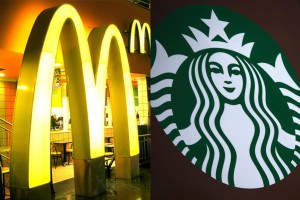By Kiley Crossland
 (WNS)–Despite nearly 25,000 supporters, a public campaign asking McDonald’s and Starbucks to install anti-pornography filters on their in-store free WiFi networks has so far been unsuccessful.
(WNS)–Despite nearly 25,000 supporters, a public campaign asking McDonald’s and Starbucks to install anti-pornography filters on their in-store free WiFi networks has so far been unsuccessful.
The “Porn Free WiFi” campaign, organized by the internet safety group Enough is Enough (EIE), is urging the fast-food and coffee giants to implement internet filters in their U.S. stores to stop customers from accessing or distributing child pornography and graphic adult pornography via their free internet connections.
EIE cites news stories chronicling instances of open WiFi hotspots becoming hideaways for criminals trafficking child pornography or sexually soliciting children. “The ‘Porn-free WiFi’ campaign is not just about protecting our children from viewing hard-core pornography using public hotspots—it’s also about limiting the safe-haven that open WiFi creates for sexual predators,” said Donna Rice Hughes, EIE’s CEO.
EIE sent letters to McDonald’s and Starbucks in April, applauding both businesses for pro-actively implementing internet filters in their U.K. stores. McDonald’s U.K. website claims it was the first company to join a family-friendly WiFi filtering initiative called Mumsnet. Earlier this year, Starbucks joined an industry-wide public WiFi filtering effort called “Friendly WiFi.” Colorful banners are displayed in restaurants offering free internet that is filtered for explicit content. In 2013, British Prime Minister David Cameron introduced nationwide policies to protect children from exploitive and graphic material online, including a default setting of “opt-out” for all internet service providers.
In the letters, Hughes urged the two U.S.-based companies to implement the same filters in their stores at home, noting other major chains, like Chick-fil-A and Panera, already filter their free internet access voluntarily.
“We appreciate your concern and are looking into options for effective filtering in the U.S.,” McDonald’s said in a written response to Hughes. The fast-food chain has continued a dialogue with EIE, Hughes said, but in the seven months since the letter exchange neither McDonald’s nor Starbucks has added filters to their combined 25,000 U.S. stores.
Hughes believes the campaign “strikes a nerve with Americans.” People expect corporations that project a family-friendly image to have family-friendly corporate polices, she said. And support for the “Porn Free WiFi” campaign is growing. In the last few weeks, three more partner organizations—Concerned Women for America, Morality in Media, and the National Homeschoolers Association—have joined EIE’s efforts.
The group’s next step is to approach McDonald’s and Starbucks again, this time also including the petition signatures it has collected. Hughes is confident the two major stores will soon implement filters, setting an example for other free WiFi providers.
“This is something that any family and any parent can get behind,” Hughes said. “This is not a controversial request we are making. This has nothing to do with censorship or First Amendment rights. It has nothing to do with anything but these corporations doing the right thing.”







